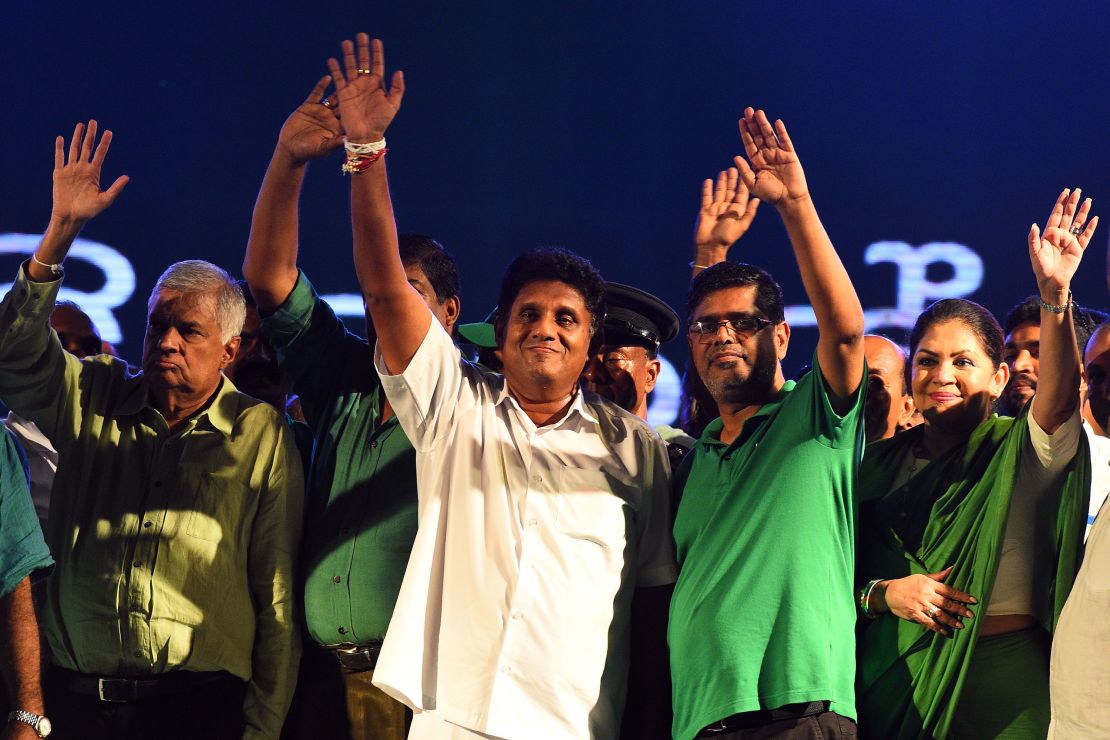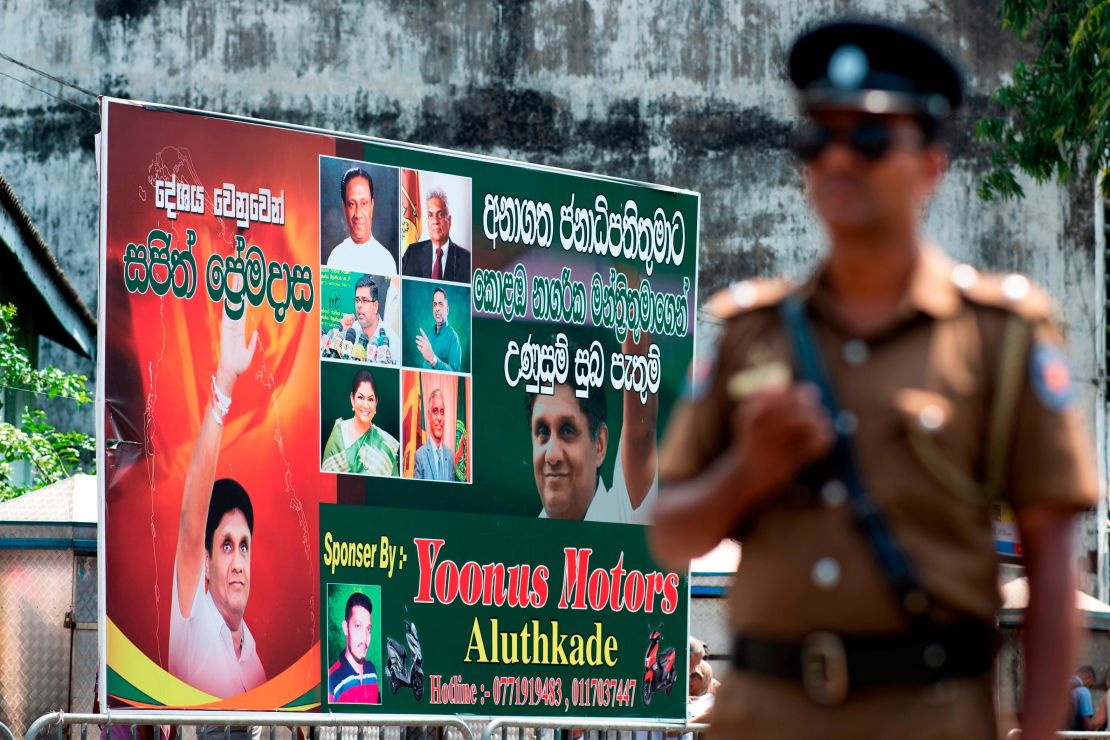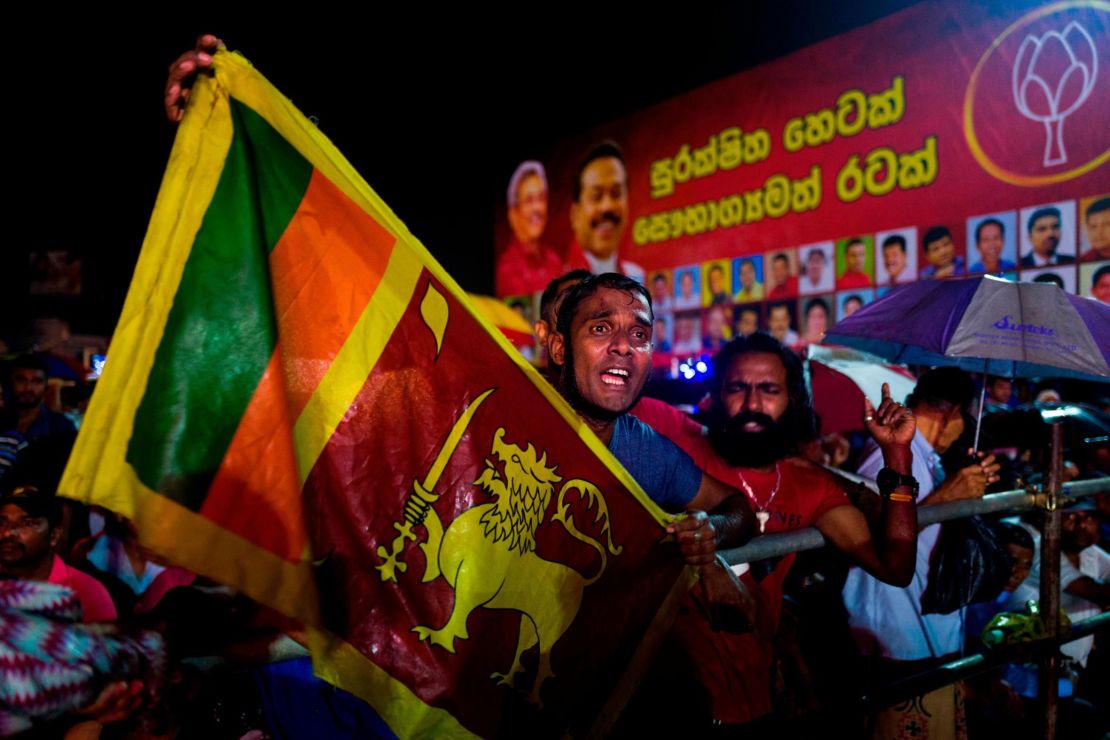Sri Lankans head to the polls Saturday to elect a new President months after deadly terrorist attacks shook confidence in the government and security services and left more than 250 people dead.
A record 35 candidates are vying to replace outgoing President Maithripala Sirisena, and election officials said the ballot paper will be 26 inches (66 centimeters) long in order to include them all.
Sirisena’s term was marred not only by the Easter bombings but also by a failed attempt to remove Prime Minister Ranil Wickremesinghe from office. That sparked a constitutional crisis that even when resolved by the Supreme Court – which restored Wickremesinghe to his position – left a government essentially cleaved in two. It also exacerbated communication failures that meant key information which might have stopped the bombings was not acted on.
Under the Sri Lankan system, the Prime Minister is appointed by the President from members of Parliament, who nominate the most suitable.
Who are the frontrunners?
Amid the dozens of potential candidates, two men are seen as the likeliest to replace Sirisena: former Defense Secretary Gotabaya Rajapaksa and Minister of Housing Sajith Premadasa.
The 70-year-old Rajapaksa only this year renounced his dual-US citizenship in order to contest the poll. He has been closely flanked at all public and media appearances by his elder brother, Mahinda Rajapaksa, who is blocked from running after serving two terms as President from 2005 to 2015.
Few doubt that were Gotabaya Rajapaksa to win – under the maroon banner of the Sri Lanka People’s Front – his brother would wield massive influence over his administration and could be considered President again in all but name. The elder Rajapaska currently leads the opposition in Parliament and is widely expected to vie for the post of Prime Minister when parliamentary elections are held in 2020 – bringing the country back in control of the two brothers.

The Rajapaksa ticket is considered the favorite, with Premadasa, the charismatic son of a former President, a close second.
Premadasa is deputy leader of the ruling United National Party (UNP), but is contesting the election as a representative of the New Democratic Front, a coalition of right-wing parties.
UNP leader, and incumbent Prime Minister, Wickremesinghe, might have been expected to stand as the party’s presidential candidate, but stood aside for the more popular Premadasa, who is seen as having a better chance to beat Rajapaksa.
Premadasa is the son of onetime President Ranasinghe Premadasa, who was assassinated by Tamil Tiger rebels at a May Day rally in Colombo in 1993.
While Sirisena is not barred from running, he has chosen not to stand in the upcoming election and instead will remain “neutral.” Despite this, his Sri Lanka Freedom Party (SLFP) is backing Rajapaksa, though some prominent members have come out in favor of Premadasa.
A long-shot but nevertheless feasible candidate – among the other 33 – is retired General Mahesh Senanayake, who retired as Commander of the Sri Lankan Army in August and is standing on behalf of the National People’s Movement (NPM), a coalition of civil society groups.

What are the issues?
When a series of suicide bombs tore apart churches and hotels across Sri Lanka on Easter Sunday, most of the country – and the rest of the world – was taken completely by surprise.
But in the capital, Colombo, it was not a shock to everyone. Revelation after revelation in the wake of the bombings exposed a host of intelligence and security failures which had allowed a relatively inexperienced Islamist terror cell, and one whose members were known to the security services, to carry out a devastating series of attacks.
The bombings shattered an uneasy sense of security that had built slowly after the end of the 25-year civil war with Tamil separatists, and devastated a thriving tourism industry, that saw 2.33 million arrivals in 2018. They also sparked a return to interethnic strife, as hardline Sinhalese nationalists and Buddhist extremists were emboldened to attack the country’s Muslim minority.
It was under Mahinda Rajapaksa that the Tamil Tigers were crushed, and some see security in a return to his style of hardline rule. His brother Gotabaya served as his defense minister and oversaw the operation that ended the war. But both have also been implicated in various human rights abuses, charges they deny.
For his part, Premadasa has promised to appoint as defense minister another war hero, Sarath Fonseka, onetime army field marshal and current member of parliament.
Fonseka was a strident critic of the government’s handling of the Easter bombings, and warned that the country was failing to “maintain the peace we had won.”
As well as security, the next President will face the task of continuing to rebuild the country’s tourism industry in the wake of the attacks, and balance Sri Lanka’s alliances with India and China, which have long tussled for influence in the island nation.

How does the election work?
There are 15.9 million eligible voters in Sri Lanka, out of a total population of 21 million, spread across 22 electoral districts.
Polls open Saturday at 7 a.m. local time (8:30 p.m. ET Friday), closing at 5 p.m. (6:30 a.m. ET), an hour later than at previous elections.
The winner is expected to be announced by Monday midday, but election officials have warned of potential delays should the result be contested or candidates demand a recount.
Iqbal Athas reported from Colombo. James Griffiths reported from Hong Kong. Manveena Suri reported from New Delhi. CNN’s Joshua Berlinger contributed reporting from Hong Kong.


